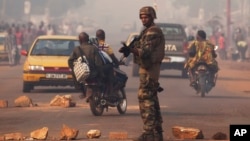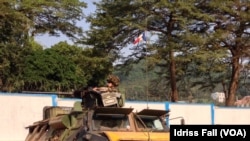DAKAR, SENEGAL —
The U.N. Security Council is scheduled to discuss the situation in the Central African Republic Monday, amid mounting calls for a U.N. peacekeeping force to stop communal violence that exploded one month ago. More than 1,000 people have died and nearly a million displaced from their homes. French and regional troops in the CAR are not seen as impartial or entirely up to halting the clashes.
French and African Union troops intervened in the CAR after communal violence broke out in the capital Bangui on December 5, but the killing continues. Religious and communal tensions are running high.
Some Central Africans said they want U.N. troops to intervene.
This Bangui resident, Mathieu Lamba, said "blue helmets mean protection for civilians." He said, "judging by what has been going on in this city, I can tell you that French and the African Union troops have failed."
He said the French troops were disarming fighters but they changed their tactics after they lost those two soldiers. "We need U.N. troops to protect civilians and get life back to normal," said Lamba.
But others did't see what difference it would make.
Yakaka Abel, asked "Wouldn't the U.N. troops be coming to accomplish the same thing that the international troops already here are trying to do? So shouldn't we just reevaluate and improve the strategies and techniques of these troops?"
Analysts said that U.N. force would likely be the same international troops already there and just "re-hatted" in blue, something similar to what was done in Mali last year.
That process would probably take two to three months.
French officials are pushing for a U.N. force. France currently has 1,600 troops in the CAR but cannot sustain a long-term military engagement and wants to hand it off by the middle of this year.
That would likely not be possible unless the African Union troops get the kind of logistical and financial support that analysts said the U.N. could provide.
But analysts cautioned that the U.N. would be inheriting a problematic force.
Chadian troops, while seasoned and well-equipped, have tended to act autonomously in the CAR. They also may not meet standards for integration into a U.N. force.
The rest of the AU force has been weighed down by logistical issues, like delays transporting troops from their home countries.
The spokesman for the CAR's ex-rebel leader-turned-president said it was too soon to talk about blue helmets.
Presidential spokesman Guy Simplice Kodegue said they haven't even got the 6,000 African Union soldiers on the ground yet and that force doesn't have the appropriate funds in place. He said, "let's focus on that instead of jumping ahead."
But some say a U.N. force would offer more guarantees of impartiality.
The French are accused of not cracking down on the mainly Christian militias and instead focusing on disarming the mainly Muslim rebels who plunged the country into chaos last March.
Chadian troops are accused of siding with those ex-Seleka rebels.
Head of research at the Kofi Annan Peacekeeping Training Center in Accra, Kwesi Aning, said re-hatting to the U.N. could mean more legitimacy.
"A U.N. force is better equipped, is better trained and is [more] ready to protect civilians," said Aning.
He said a U.N. approach was also more comprehensive. "The U.N. doesn't just say we are going in to separate the different parties. The U.N. comes in and seeks to rebuild fundamental institutional infrastructure."
That's something that analysts said was essential for the CAR, which has mired in political unrest and poor humanitarian conditions for decades.
Jose Richard Pouambi contributed reporting from Bangui.
French and African Union troops intervened in the CAR after communal violence broke out in the capital Bangui on December 5, but the killing continues. Religious and communal tensions are running high.
Some Central Africans said they want U.N. troops to intervene.
This Bangui resident, Mathieu Lamba, said "blue helmets mean protection for civilians." He said, "judging by what has been going on in this city, I can tell you that French and the African Union troops have failed."
He said the French troops were disarming fighters but they changed their tactics after they lost those two soldiers. "We need U.N. troops to protect civilians and get life back to normal," said Lamba.
But others did't see what difference it would make.
Yakaka Abel, asked "Wouldn't the U.N. troops be coming to accomplish the same thing that the international troops already here are trying to do? So shouldn't we just reevaluate and improve the strategies and techniques of these troops?"
Analysts said that U.N. force would likely be the same international troops already there and just "re-hatted" in blue, something similar to what was done in Mali last year.
That process would probably take two to three months.
French officials are pushing for a U.N. force. France currently has 1,600 troops in the CAR but cannot sustain a long-term military engagement and wants to hand it off by the middle of this year.
That would likely not be possible unless the African Union troops get the kind of logistical and financial support that analysts said the U.N. could provide.
But analysts cautioned that the U.N. would be inheriting a problematic force.
Chadian troops, while seasoned and well-equipped, have tended to act autonomously in the CAR. They also may not meet standards for integration into a U.N. force.
The rest of the AU force has been weighed down by logistical issues, like delays transporting troops from their home countries.
The spokesman for the CAR's ex-rebel leader-turned-president said it was too soon to talk about blue helmets.
Presidential spokesman Guy Simplice Kodegue said they haven't even got the 6,000 African Union soldiers on the ground yet and that force doesn't have the appropriate funds in place. He said, "let's focus on that instead of jumping ahead."
But some say a U.N. force would offer more guarantees of impartiality.
The French are accused of not cracking down on the mainly Christian militias and instead focusing on disarming the mainly Muslim rebels who plunged the country into chaos last March.
Chadian troops are accused of siding with those ex-Seleka rebels.
Head of research at the Kofi Annan Peacekeeping Training Center in Accra, Kwesi Aning, said re-hatting to the U.N. could mean more legitimacy.
"A U.N. force is better equipped, is better trained and is [more] ready to protect civilians," said Aning.
He said a U.N. approach was also more comprehensive. "The U.N. doesn't just say we are going in to separate the different parties. The U.N. comes in and seeks to rebuild fundamental institutional infrastructure."
That's something that analysts said was essential for the CAR, which has mired in political unrest and poor humanitarian conditions for decades.
Jose Richard Pouambi contributed reporting from Bangui.












